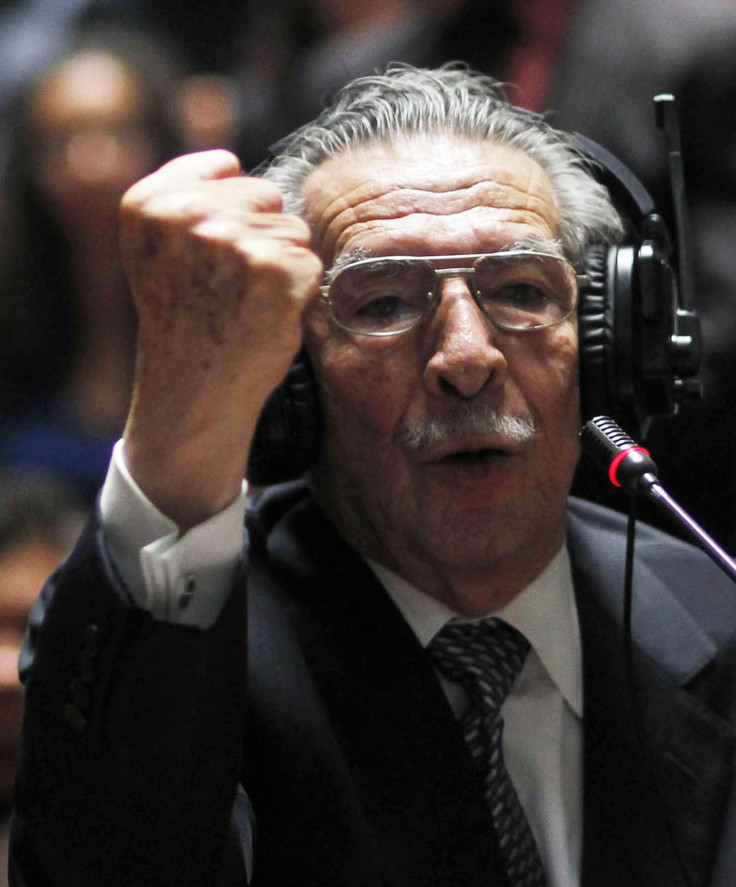
The conviction of General Efraín Ríos Montt, ex-dictator of Guatemala, for genocide and crimes against humanity, has been overturned by Guatemala's Constitutional Court, in a 3-2 ruling. The Court decided in favor of defense attorneys who had challenged the ruling on the grounds that due process had not been granted. Ríos Montt, who is 86, had been sentenced to 80 years in prison for ordering the deaths of 1,771 indigenous Ixil Mayans in the northern Guatemalan province of Quiché. After fainting shortly after the trial, he was transferred to a military hospital; upon his release he will return to house arrest, on which he had been held since the genocide trial began in January 2012.
In addition to Ríos Montt, who ruled the country from 1982-1983 after seizing power in a coup, José Mauricio Rodríguez Sánchez - chief intelligence officer during the period - had also been tried, though he was found innocent of the crimes. His absolution was also annulled. It was unclear whether he would be rearrested, according to the New York Times.
RELATED:
In Shocking Turn, Current President Implicated by Former Soldier
Ríos Montt Trial Recommences After Five-Day Suspension
Ex-Dictator Faints After Sentence
All proceedings occurring after April 19 were annulled. On that date, one of the presiding judges suspended the trial because of a dispute with another lower-court judge over who should hear the case.
The ex-dictator's defense team had fought tooth and nail throughout the trial, repeatedly challenging the very legitimacy of the proceedings. On April 18, the defense team walked out of court in protest of the court's order that Ríos Montt be represented by a public defense lawyer instead of lawyer Francisco Garcia, who had repeatedly tried to have judges dismissed for bias. Garcia was readmitted and expelled again on April 19 after accusing the judges of failing to hear his legal challenges, according to BBC News. The ruling on Monday indicated that Garcia's challenges should have been heard that day and voided everything that occurred after them.
The defense team's constant disputations have been backed by the Guatemalan Association of Military Veterans (Avemilgua), which had threatened to shut down the country by deploying members to blockade streets. Avemilgua also ran advertisements in the press denying that the genocide had ever occurred. They were joined by Civil Self-Defense Patrols (PAC), whose ranks number about 50,000, and the finance and business committee Cacif, which Spanish newspaper El Pais calls "all-powerful".
The decision was a blow to human rights advocates in Guatemala, who see the trial as an important step toward ending the impunity of military authorities in the Central American country. Amnesty International called it a "devastating blow for the victims of the serious human rights violations committed during the conflict".
The massacres and rapes of which Ríos Montt stands accused happened during the civil war lasting from 1960 through 1996. Government authorities kept a policy of treating Ixil villagers as collaborators with Marxist rebels. About 200,000 Guatemalans were killed and 45,000 disappeared, with some 93 percent of the deaths coming at the hands of government forces. During trial proceedings, one witness who testified by video from an undisclosed location implicated current president Otto Pérez Molina in the burning and looting of an Ixil village, in a turn which produced gasps from many in the courtroom. Pérez Molina, who is protected from prosecution by Guatemalan law, denied the accusation.
"I'm distressed," Ana Caba, an Ixil who fled her home during the massacres, told Reuters. "I don't know what's happening. That's how this country is. The powerful people do what they want and we poor and indigenous are devalued. We don't get justice. Justice means nothing for us."
© 2025 Latin Times. All rights reserved. Do not reproduce without permission.




